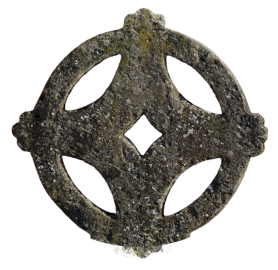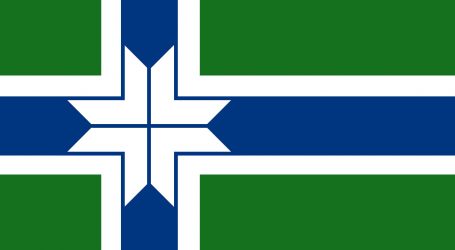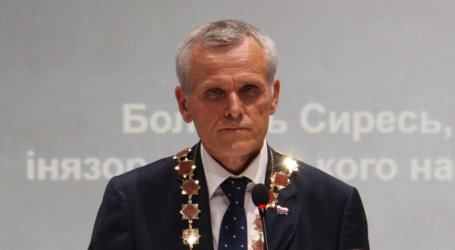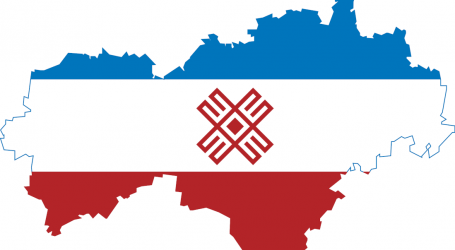Ěrzäń Inäzor Syreś Boläeń : The members of the Erza delegation cannot be considered as representatives of the Erza peoples.
The official Erzan people elder, Ěrzäń Inäzor, Syreś Boläeń, who arrived in Tartu at the VIII World Congress of Finno-Ugric Peoples, made an official statement by the entrance of Estonian National Museum, where the congress is held, to draw attention to the real problems that Finno-Ugric Peoples have to endure on a daily basis and the real objectives that Fenno-Ugria (the World Congress of Finno-Ugric Peoples) must pursue in order to ensure a meaningful capacity for the survival and easing of the relentlessness pressure on of the tribesman in the territory of the present Russian Federation, most of which are Finno-Ugric and Samoyed Peoples. We are publishing the Inäzor Syreś Boläeń addressing.
In order to prevent the arrival of the real representatives of the Ersa peoples to the VIII World Congress of the Finno-Ugric Peoples, the representatives of the Russian Federation delayed a year and a half by announcing that the paperwork for the congress was incomplete, where the announcement was revealed two (2) days before the deadline for registration to the congress and two weeks before the congress began. The Erzan representatives did not have any chance of obtaining a visa to travel from Russia to Estonia for the eighth Fenno-Ugria. Representatives of the Finno-Ugria Consultative Committee sent the list of Erzan delegation to the Russian Federation officials for the approval. At the same time, Estonia officially ranks Fenno-Ugria as a non-governmental organization, but nevertheless the Fenno-Ugria organizers coordinated the entire delegation of the Erzan representatives with the officials of the Russian Federation. The Estonian Government does not control the Congress, but the delegates must be confirmed by the Russian Federation, which means that Russian officials exercise the choice, approval and preference of the delegation. The members of the delegation, which were cherry-picked by the Russian Federation officials, do not stand up for the real problems and do not talk about the real problems in the Russian Federation. It was precisely the Fenno-Ugria Consultative Committee political preference that the representatives of the Erzan peoples did not have the opportunity to participate in the congress because of the targeted countermeasures of the officials of the Russian Federation.
I, as the Ěrzäń Inäzor, the elected elder by the Erzan Elder Council, cannot regard members of the delegation representing the Erzas as representatives of the Erza peoples. This is not the first international congress we, the real representatives of the Erza peoples, have tried to get into. Finno-Ugria as the meeting place for Finno-Ugric peoples to exchange ideas is in a very deep crisis where it is becoming into an analogy of the Russian European Association of Finno-Ugrian Peoples forums, where the solemn event has only a protocol objective and excludes acute problems at any cost, so as not to upset the Russian Federation, regardless of the actual policies they are taking against the indigenous peoples. Finno-Ugria is increasingly reminiscent of the gathering of Finno-Ugric peoples and is increasingly reminiscent of the folklore performance. Finno-Ugria is fundamentally incapable of making the decisions on the real problems of the Finno-Ugric peoples, especially the problems of the peoples who live in the Russian Federation. hey can’t even speak out loud in order not to upset the Russian Federation. These acute problems do not require concerts or group pictures in national clothes; these acute problems require the implementation of international measures to put pressure on Moscow to tackle the problems. As Fenno-Ugria is very important to the Erza peoples we propose amended for the Fenno-Ugria format, where it would become a meeting place for Finno-Ugrian activists, not a meeting place for public officials. That is why we want amendments to the regulations as following:
- the Finno-Ugric peoples have their own independent decision-making power in the composition of the delegations and cannot be audited by public officials. Ersa, Mari, Moksha are full-fledged peoples, not subdivisions of the national cultural or federal agency of the national authorities. The Ersa Elder Council is not subject to any governmental structures of the Russian Federation. The fact that the Finno-Ugria Consultative Committee is forcing the Erza peoples to follow the orders of the officials of the Russian Federation is an extremely shameful realization. This must be brought to a definite end.
- Fenno-Ugria must have representatives of the people, not officials, departments or internal security units of the state structure. State officials must be banned from participating in the Fenno-Ugria as a delegate. They may be represented, but only as guests without voting rights. The representatives of the state structure and the people’s representatives are two completely separate communities. The leaders of the Association of Finno-Ugric Peoples, cherry-picked by the Kremlin, cannot be the basis of national representation.
- The members of the delegation on the opening day of Finno-Ugria must definitely be published and be public. It can’t be closed information. It is necessary to know precisely who is representing the Finno-Ugric peoples, who are speaking in the name of one or another people.
- It is necessary to create the prerequisites for each representative of the people to have the right to speak from the Fenno-Ugria tribune, to speak freely about their real problems, to propose solutions to them. To date the utmost problems of Finno-Ugric people living in the Russian Federation today include the self-immolation of Albert Razin, the killing of Evgeni Jushkov, the ban on the traditional religion of the Mari people, the vetoing of the Ersa gymnasium in Saransk, the removal of indigenous languages from school textbooks. We have the right to talk about these problems. In reality, however, we are being sent to listen to lectures on climate change.
I expect to be given the right to speak from the Fenno-Ugria tribune during the congress. I want to fulfil the expectations of the Erza Elder Council, talk about the Erza people current state, and submit proposals to the congress delegates for discussion. I, as the Ěrzäń Inäzor, openly appeal to the Republic of Estonia, where we want to receive a response to the letter addressed to the Riigikogu by the indigenous people to the Chairman of the Riigikogu, Henn Põlluaas, in May 2020, to which no reply has yet been received. Many of the signatories to this appeal, who have remained in the territory of the Russian Federation, have already been subject to official surveillance and restrictions of rights by the Ministry of the Interior and the FSB. I ask the Estonian Government not to delay the answer, because people risk their lives and freedom simply because they turn to their Estonian tribesmen. We expect our tribesmen to listen to us.
Thank you for listening.
The Estonian version of the article is available here




